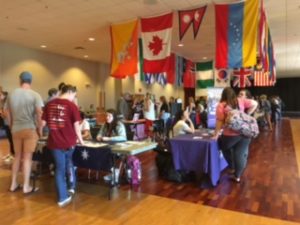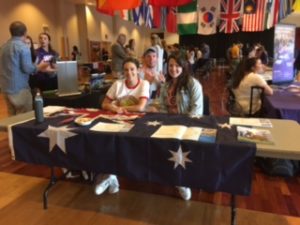The world is at your fingertips!
For WCU students, a trip abroad could range from a couple of weeks to a full year with the ability to chose from over 60 countries including Japan, Germany and the U.K.
The Study Abroad Fair showcased these opportunities for students from 12:30 p.m. to 4 p.m. on Tuesday, Sept. 19 in the UC Grand Room. Here’s a recap of the event for anyone a bit curious about how to travel and earn your degree at the same time!

Tables are set up for different countries and programs. Photo by Keegan Wiggins.
According to Jim Gieser, a study abroad advisor, the main goal of the event was to inform students of the various opportunities that available to them and to find the best fit for them as well.
“I hope that students see that it’s possible and get sense for all the opportunities that are available to them for the summer, for the semester, for the year,” said Gieser.
To Gieser, studying abroad is much more than going to another country.
“It’s about stepping out of the known and stepping out the what’s familiar, what’s comfortable for some people,” said Gieser. “And in that process, you learn so much about yourself and you learn so much about other societies, other cultures, how they do life.”
The study abroad office provides students with six ways to study abroad:
- Faculty-Led
- Bilateral
- International Student Exchange Program (ISEP)
- Direct
- Third Party
- Internship
First, faculty-led trips are anywhere from one to eight weeks and are led by a WCU faculty member in an international setting. Additionally, these are usually paired with a specific class.
Next, bilateral is an exchange of students between WCU and another university abroad. For example, a student from WCU would attend Beijing University of Technology in China while the student from China would study at WCU.
With ISEP, there are two ways for students to travel abroad. First, a WCU student would swap places with a student from an ISEP university, similar to the bilateral exchange. Secondly, students can be directly enrolled at an ISEP university.
A direct enrollment is where a WCU student attends a partner university. Some of WCU’s partner universities include Stellenbosch University in South Africa, Spain’s ILYC Language School and Italy’s Lorenzo Di Medici Institute.

Students taking the opportunity to learn about various studying abroad options. Photo by Keegan Wiggins.
When it comes to third party programs, WCU’s study abroad office doesn’t administer or control them. Before a student can apply for a third party program, they must first be approved by the Study Abroad Office.
In order to intern abroad, students will have to use a third party that provides internships. If interested, students need to contact WCU’s Center for Career and Professional Development. Additionally, students should contact their advisor or department head to find the right fit for their major.
For students contemplating studying abroad, Peta Petidis, a foreign exchange student from Australia, encourages them to take the chance.
“I would 100 percent recommend studying abroad because you don’t get many opportunities in live to travel and it’s so much easier when you’ve got your university or institution backing you to do so,” said Petidis.
With the amount of opportunities provided by the study abroad office, students can fine tune their trip to fit the major. For example, Alastair Taylor, a foreign exchange student from the U.K., is here to study American history.
“My favorite thing [about studying abroad] is learning history in a different way, so I get to take a course about North Carolina history, and if you’re in the UK, you would never get something like that,” said Taylor. “It allows a new take on your history, on your understanding of history, in a good way.”

Australia’s table posing for the camera. Photo by Keegan Wiggins.
If a student really just wants to visit a country they have never been to before, the study abroad office will make sure the trip fits academically with that specific student’s major. For example, WCU student Audra Bobender went to Sydney, Australia because she really wanted to go somewhere new.
“I kind of chose it on a whim. Honestly, I just really wanted to study abroad and go to a country that I’ve never been to,” said Bobender.
For students that are on the fence about studying abroad, Gieser just wants you to know:
“After college you have to get a job and pay the bills,” said Gieser. “So, this is the opportunity to leave this time zone, cross the ocean, and join a community of students from another part of the world and immerse yourself in that culture.”
Go see where WCU takes you!
This story was edited at 10 a.m. on Sept. 21. Saudi Arabia was removed because it is not a study abroad option.


